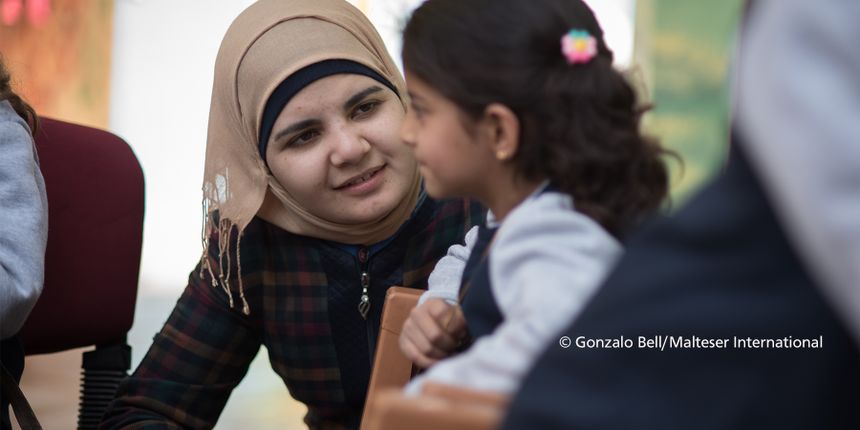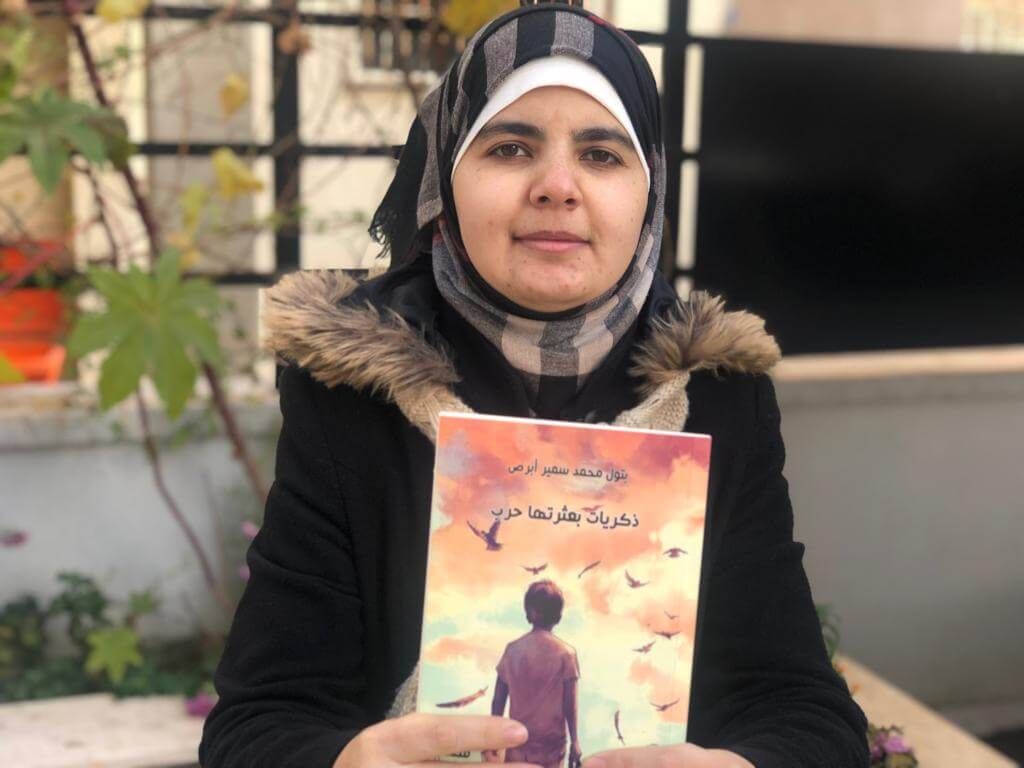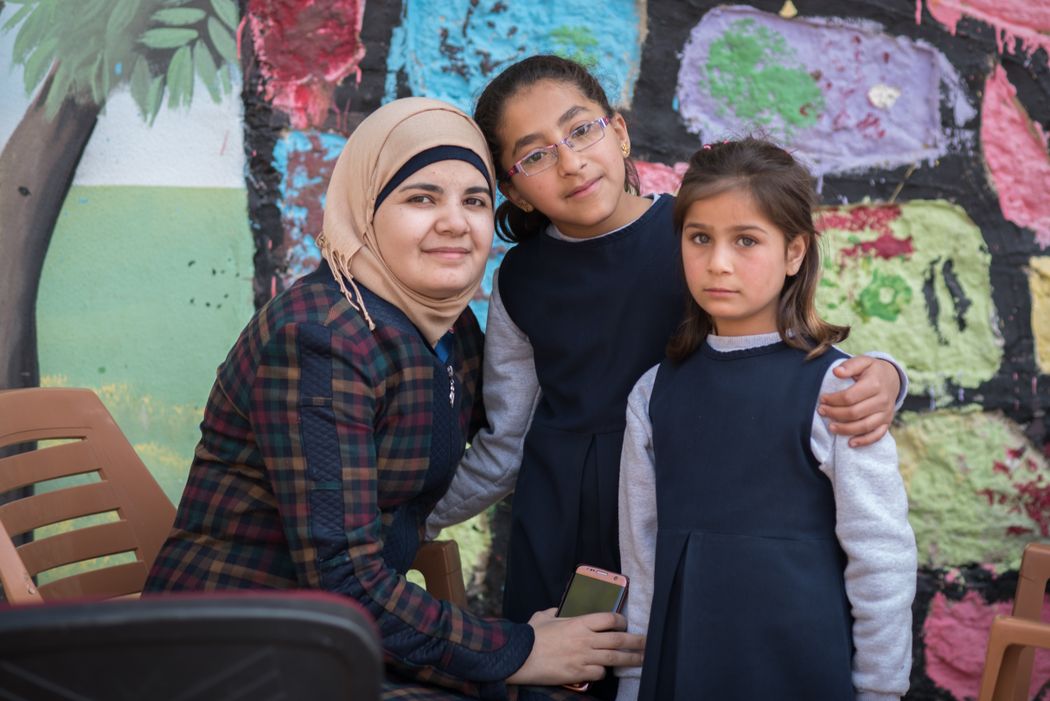
Faces of our work: Betul Abras
Giving a voice to fellow Syrians in exile
When Betul Abras graduated in Psychology from the University of Aleppo, the Syrian Civil War was already underway. In 2013, she left her job in the country and, with her parents, became herself one of millions of Syrian refugees in Türkiye. She worked in a community center of the International Blue Crescent (IBC) in cooperation with Malteser International providing mental health and psychosocial support to thousands of refugees in Kilis, Türkiye. Today, Betul works with Malteser International to prepare projects in psychosocial support and trains partner organizations of Malteser International on psychologically related healthcare topics. Her book "Memories Shattered by War" tells the story of ten Syrian refugees in Türkiye and their experiences of the brutal conflict that has sparked the largest humanitarian crisis of our time.
Susan is one of the ten refugees who narrates her experiences in Betul's book.
"One day, as the bombings intensified, my husband Ahmed and I sat in the living room while our ten-year-old daughter Shams did her homework in her room. We became very terrified. That was the moment Ahmed and I decided it was time to leave Aleppo. He went to our neighbor to ask him if he knew a way out of the city. I went to Sham's room, packed her clothes, books, and notebooks because she wouldn't leave without them. Afterwards, I went into my room to get some clothes for myself and Ahmed when suddenly I heard a loud noise and smoke filled the whole room. I couldn't see anything. I shouted 'Shams, Shams!' but she didn't answer."
A family's ordeal in the face of loss, violence and hopelessness

When Susan and Ahmed's daughter was recovered from the rubble hours later, it was too late. Some years later Susan recounts the events of that traumatic afternoon to psychologist Betul Abras. "It is stories like these that led me to write a book about the horrors of the war in Syria," says Betul. "Shams's story touched me the most. Her parents had been trying in vain to have a child for the past ten years. When Shams was born, it was a miracle. With her death, Susan, her mother has lost every will to continue living. When I met her, she hardly spoke a word. She would sit silently in the group sessions and hardly participated in what was happening around her. But I knew I had to be patient. As time went by, we build some level of trust, she listened to the other women talk about their own experiences. Then she also began to confide in me. When I wrote down her story years later, I cried all the time. It touched me a lot."
Betul Abras: Syrian refugee helping fellow citizens in Türkiye
Betul Abras was still studying psychology in Aleppo when the war broke out in Syria and the security situation grew worse from month to month. She completed her studies in 2012 and began an internship at a children's institution where she looked after children whose parents were in prison. However, with bombardments and the conditions in Aleppo getting worse, Betul and her parents fled to Türkiye in 2013.
They first found refuge in the Turkish border town of Kilis, worked in a community center of the International Blue Crescent (IBC) in cooperation with Malteser International providing medical, educational and community facilities to thousands of refugees. She led a five-strong team of psychosocial workers as a psychologist from 2013 to 2016. Respectful conversations and her writing skills helped Betul to cope with her own traumatic experiences.
The cruelty of war that has permeated every area of the Syrian society is reflected in the stories Betul's patients tell in her book. "The greatest challenge in writing this book was to make a selection of the stories. So many of my patients' stories had touched me. I tried to give different patients a chance to tell their stories in order to show the brutality of this war in all its diversity," says Betul. In three years of psychosocial care for refugees, hundreds of patients have visited her, sometimes she attends to 30 people in a single day.
Respect and a listening ear - two very rare virtues in times of war - are essential to Betul's work, and crucial to the refugees telling her their tales of suffering. That is also why the accounts in her book are so personal and vivid.
"When I meet a patient for the first time, I try to create a calm and relaxed atmosphere by talking to them about very general issues, such as their favourite subjects or activities. If the patient is injured, I try to find out the cause of the injury. It is particularly important to listen attentively to the patient, pay attention to everything they say, and show them respect and appreciation."
This is how she was able to create an evocative portrayal of the outcomes of the war on the survivors. The reports also show how well she succeeds in building trust with people.

Refugees often face obstacles preventing them from integrating into their host communities. For those who have suffered traumatic experiences, the process of integration can be daunting. Malteser International is helping Syrian refugee women integrate into Türkiye by empowering them with tools needed to live independently in the society. Our psychosocial support services for women and children help regain their mental and emotional balance. In individual or group therapy sessions, they can talk about their past to help them heal the wounds of trauma. In addition to providing vocational training in catering and handcrafts, Malteser International also organizes langugae courses in Turkish and English language.
Betul Abras no longer works directly with patients. She works for Malteser International as an officer for Monitoring and Evaluation in our Türkiye office.
However, she still holds on to the stories of her patients. "Writing down these ten life experiences has helped me better understand my own experiences of displacement and the painful stories of these people. I didn't want to be the only one to hear these terrible reports. I want the whole world to know about the immense suffering this war has caused," she says.
Photo credits: Gonzalo Bell/Malteser International
How you can help refugees like Susan
- Years of relentless fighting have caused misery and suffering to millions of Syrian men, women and children.
- We are providing life-saving help and medical services for people in Syria, especially those who are internally displaced.
- Join our donation appeal and support our efforts for people in need in Syria with your donation.








